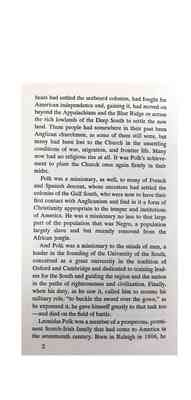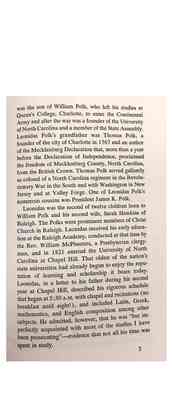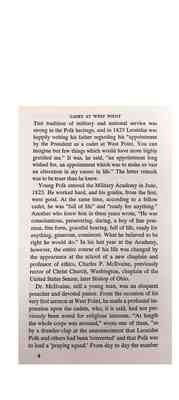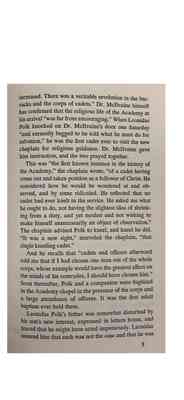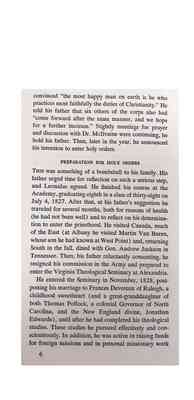Pages
6
bears had settled the seaboard colonies, had fought for American independence and, gaining it, had moved on beyond the Appalachians and the Blue Ridge or across the rich lowlands of the Deep South to settle the new land. These people had somewhere in their past been Anglican churchmen, as some of them still were, but many had been lost to the Church in the unsettling conditions of war, migration, and frontier life. Many now had no religious ties at all. It was Polk's achievement to plant the Church once again firmly in their midst.
Polk was a missionary, as well, to many of French and Spanish descent, whose ancestors had settled the colonies of the Gulf South, who were now to have their first contact with Anglicanism and find in it a form of Christianity appropriate to the temper and institutions of America. He was a missionary no less to that large part of the population that was Negro, a population largely slave and but recently removed from the African jungle.
And Polk was a missionary to the minds of men, a leader in the founding of the University of the South, conceived as a great university in the tradition of Oxford and Cambridge and dedicated to training leaders for the South and guiding the region and the nation in the paths of righteousness and civilization. Finally, when his duty, as he saw it, called him to resume his military role, "to buckle the sword over the gown," as he expressed it, he gave himself greatly to that task too - and died on the field of battle.
Leonidas Polk was a member of prosperous, prominent Scotch-Irish family that had come to America in the seventeenth century. Born in Raleigh in 1806, he
2
7
was the son of William Polk, who left his studies at Queen's College, Charlotte, to enter the Continental Army and after the war was a founder of the University of North Carolina and a member of the State Assembly. Leonidas Polk's grandfather was Thomas Polk, a founder of the city of Charlotte in 1767 and an author of the Mecklenburg Declaration that, more than a year before the Declaration of Independence, proclaimed the freedom of Mecklenburg County, North Carolina, from the British Crown. Thomas Polk served gallantly as colonel of a North Carolina regiment in the Revolutionary War in the South and with Washington in New Jersey and at Valley Forge. One of Leonidas Polk's numerous cousins were President James K Polk.
Leonidas was the second of twelve children born to William Polk and his second wife, Sarah Hawkins of Raleigh. The Polks were prominent members of Christ Church in Raleigh. Leonidas received his early education at the Raleigh Academy, conducted at that time by the Rev. William McPheeters, a Presbyterian clergyman, and in 1821 entered the University of North Carolina at Chapel Hill. That oldest of the nation's state universities had already begun to enjoy the reputation of learning and scholarship it bears today. Leonidas, in a letter to his father during his second year at Chapel Hill, described his rigorous schedule that began at 5:30 A.M. with chapel and recitations (no breakfast until eight!), and included Latin, Greek, mathematics, and English composition among other subjects. He admitted, however, that he was "but imperfectly acquainted with most of the studies I have been prosecuting"- evidence that not all his time was spent in study.
3
8
CADET AT WEST POINT
THE tradition of military and national service was strong in the Polk heritage, and in 1823 Leonidas was happily writing his father regarding his "appointment by the President as a cadet at West Point. You can imagine but few things which would have more highly gratified me." It was, he said, "an appointment long wished for, an appointment which was to make so vast an alteration in my career in life." The latter remark was to be truer than he knew.
Young Polk entered the Military Academy in June, 1823. He worked hard, and his grades, from the first, were good. At the same time, according to a fellow cadet, he was "full of life" and "ready for anything." Another who knew him in these years wrote, "He was conscientious, persevering, daring, a boy of fine presence, fine form, graceful bearing, full of life, ready for anything, generous, consistent. What he believed to be right he would do." In his last year at the Academy, however, the entire course of his life was changed by the appearance at the school of a new chaplain and professor of ethics, Charles P. McIlvaine, previously rector of Christ Church, Washington, chaplain of the United States Senate, later Bishop of Ohio.
Dr. McIlvaine, still a young man, was an eloquent preacher and devoted pastor. From the occasion of his very first sermon at West Point he made a profound impression upon the cadets, who, it is said, had not previously been noted for religious interests. "At length the whole corps was aroused," wrote one of them, "as by a thunder-clap at the announcement that Leonidas Polk and others had been 'converted' and that Polk was to lead a 'praying squad.' From day to day the number
4
9
increased. There was a veritable revolution in the barracks and the corps of cadets." Dr. McIlvaine himself has confirmed that the religious life of the Academy at his arrival "was far from encouraging." When Leonidas Polk knocked on Dr. McIlvaine's door one Saturday "and earnestly begged to be told what he must do for salvation," he was the first cadet ever to visit the new chaplain for religious guidance. Dr. McIlvaine gave him instruction, and the two prayed together.
10
convinced “the most happy man on earth is he who practices most faithfully the duties of Christianity.” He told his father that six others of the corps also had “come forward after the same manner, and we hope for a further increase.” Nightly meetings for prayer and discussion with Dr. McIlvaine were continuing, he told his father. Then, later in the year, he announced his intention to enter holy orders.
PREPARATION FOR HOLY ORDERS
This was something of a bombshell to his family. His father urged time for reflection on such a serious step, and Leonidas agreed. He finished his course at the Academy, graduating eight in a class of thirty-eight on July 4, 1827. After that, at his father’s suggestion he traveled for several months, both for reasons of health (he had not been well) and to reflect on his determination to enter the priesthood. He visited Canada, much of the East (at Albany he visited Martin Van Buren, whose son he had known at West Point) and, returning South in the fall, dined with Gen. Andrew Jackson in Tennessee. There, his father reluctantly consenting, he resigned his commission in the Army and prepared to enter the Virginia Theological Seminary at Alexandria.
He entered the Seminary in November, 1828, postponing his marriage to Frances Devereux of Raleigh, a childhood sweetheart (and a great-granddaughter of both Thomas Pollock, a colonial Governor of North Carolina, and the New England divine, Jonathan Edwards), until after he had completed his theological studies. These studies he pursued effectively and conscientiously. In addition, he was active in raising funds for foreign missions and in personal missionary work
6
